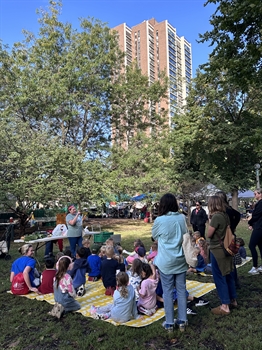Posted Oct 04, 2024

Like you, we believe that securing the future of food starts by educating the next generation. Our Farm to Market Field Trips are a key part of this effort, helping children understand who grows their food, how it’s grown, and why this knowledge is critical for a sustainable future. This month, we’re excited to share a behind-the-scenes look at these transformative experiences. Read on for a glimpse into how we inspire kids to make informed food choices that will impact their health, communities, and the planet for years to come.
We need your help to continue this important work. Your gift today will ensure more children have access to these vital Edible Education programs, empowering them to become tomorrow’s advocates for a sustainable food system.
Please consider making a donation to support GCM’s mission to secure the future of food through educating the next generation of eaters, today!
In late September, Green City Market (GCM) welcomed 48 excited kindergarteners from Mitchell Elementary School to our market for a Farm to Market Field Trip—a morning filled with hands-on learning about seasonal, local food. The children were immersed in a vibrant, colorful world of fresh produce and meaningful lessons about where their food comes from, how it’s grown, and why shopping local matters.
The day began with a journey into seasonality. The young learners explored just how far the food they find in big grocery stores travels before landing on their dinner plates, comparing it to the short distance that GCM’s farmers—who are based no more than 200 miles from Chicago—travel to bring their fresh produce to market. This eye-opening lesson sparked their curiosity about the importance of supporting local farmers, followed by a “Surprise Inside” activity where we revealed the beautiful and unexpected colors hidden within Midwest-grown vegetables.
Imagine the amazement on their faces when they discovered that carrots don’t just come in orange—they also come in purple too!
After a refreshing apple tasting, the children swapped activities and embarked on a guided market tour. They visited farmers like Tom Eich of Kankakee Valley Homestead, who gave them an inside look at how his team grows and harvests their famous "popcorn on the cob." Vendors from Kaleido Greens and Mick Klüg Farms introduced the students to broccoli sprouts, Concord and Niagara grapes, and other seasonal treats, explaining the journey from farm to table. The students stopped by GCM’s Club Sprouts tent —GCM’s other weekly kids' education program— where volunteers spoke about the significance of the harvest moon and how this natural event guides the rhythms of farming as a new season approaches.
The field trip concluded with goodie bags filled with fresh produce for students and teachers to take back to their classrooms—tangible reminders of the day’s lessons about seasonality, sustainability, and the value of local food. While the activities vary depending on the students’ ages, the heart of GCM’s Farm to Market Field Trips remains the same: to help kids understand the impact their food choices have on the future of our city and our planet, and to spark a lifelong love for local, sustainable food systems.
But these transformative experiences don’t happen without the support of our community. GCM’s Edible Education programs, like Farm to Market Field Trips, are funded by donations from people like you—people who believe in the power of educating our youngest generation about the importance of local food and sustainability.
If this story has inspired you, you can make an impact today. Help us continue nurturing the next generation of local food lovers by making a one-time donation or becoming a monthly donor.
Your gift ensures that more children have access to these crucial lessons that will shape the future of our food systems and our planet.
Join us in securing the future of food—one field trip at a time.
Together, we can nourish the next generation of food advocates.